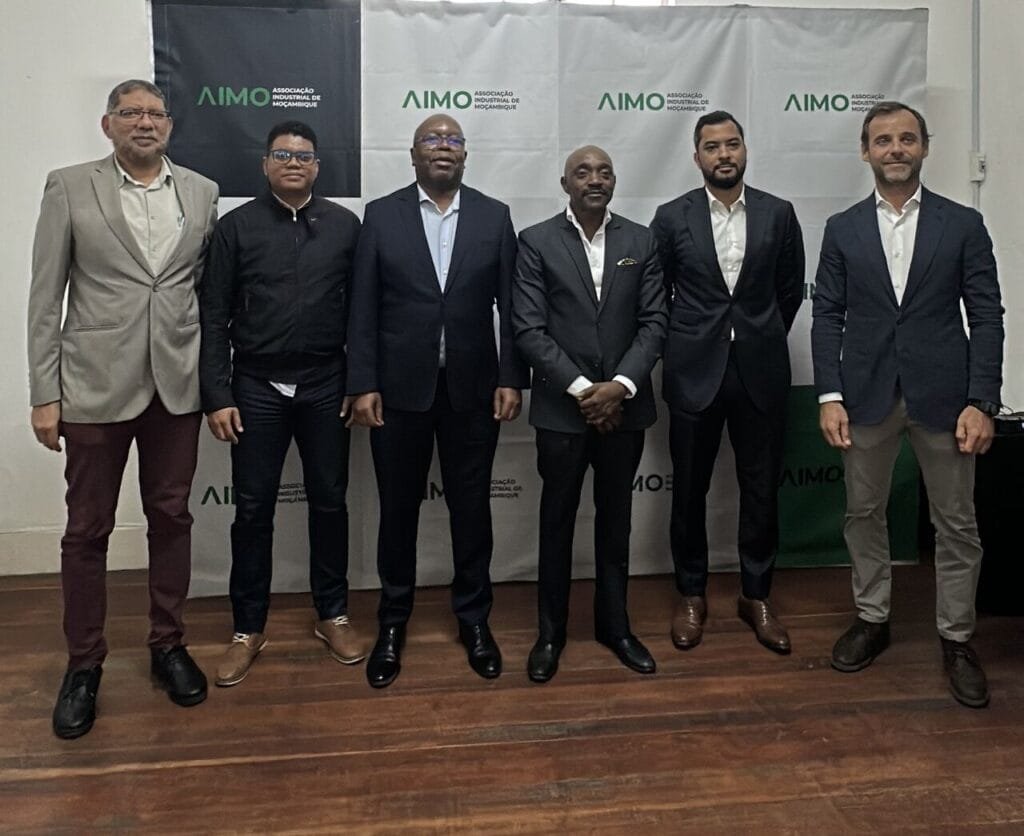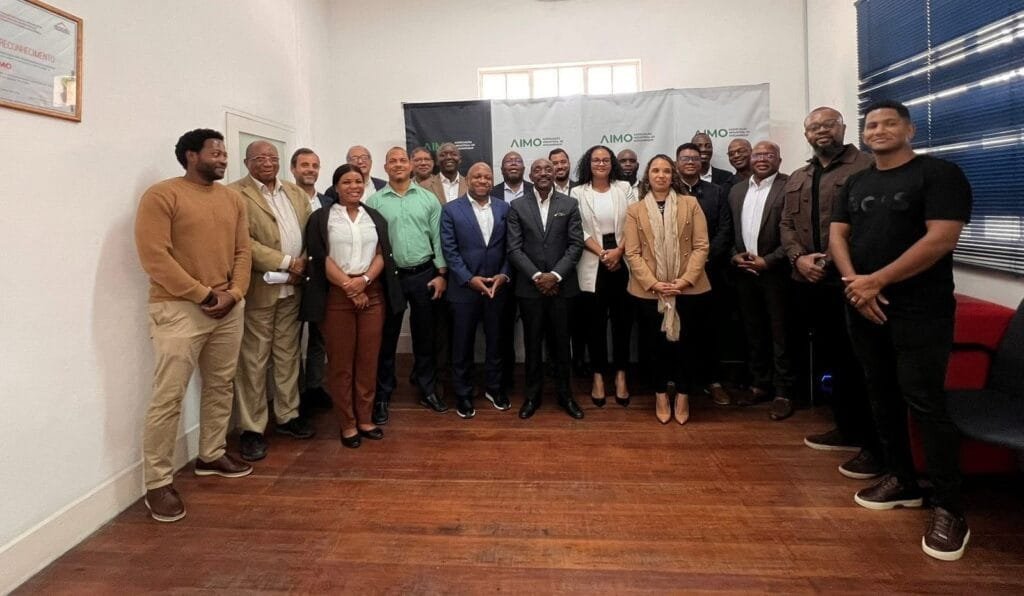In his first exclusive interview as the newly elected president of the Industrial Association of Mozambique (AIMO), Paulo Chibanga highlights that his term will be guided by three fundamental strategic pillars: strengthening internal cohesion among members, a determined investment in technical training, and facilitating access to financing, with particular focus on small and micro industries.
Profile Mozambique: What will be the main strategic priorities of your leadership at the helm of AIMO?
Paulo Chibanga: As the new management of the Industrial Association of Mozambique (AIMO), our immediate priority is to reinforce cohesion among the Association’s members, promoting their technical, financial, and institutional strengthening. We want to ensure that small and micro industries, which represent over 90% of Mozambique’s industrial fabric, have the necessary conditions to grow and become more competitive.
We intend to continue impactful initiatives, such as the Mozindus – Mozambique Industrial Forum and Exhibition, and move forward with new projects like the Industrial Development Agency and the Industrial Accreditation Program, to support technical training, business certification, and technological modernization.

Another strategic axis is to promote local content in major projects, especially in the extractive and energy sectors. We will update the courses at our metalworking training center to respond to the real needs of the market, thus creating better employment opportunities for young people. In addition, we will work with the Government and partners to find solutions that improve access to financing, which remains one of the industry’s greatest challenges.
Our commitment is that, by the end of our mandate, we will have a stronger, more competitive industrial sector, better prepared to create jobs and generate value for Mozambique.
PM: Access to financing and competitive credit lines has been pointed out as one of the main challenges facing the industrial sector. What specific proposals will AIMO bring to its dialogue with the Government and the financial system?
PC: From the perspective of the new management, access to competitive financing remains one of the biggest challenges for strengthening the national industry, particularly for micro and small enterprises, which make up the vast majority of the sector.
In the previous mandate, we began addressing this challenge in partnership with commercial banks, namely Millennium BIM, by creating a specific credit line for the industry worth about 5 billion meticais. This experience helped us better understand the real needs of the sector and revealed that, even with marginal reductions in interest rates, the cost of money remains high and largely inaccessible to most industrialists.
To address this challenge, we are preparing a baseline study that will allow us to understand in detail the current landscape of Mozambican industry and identify, more precisely, which areas need priority support. This effort will be coordinated with the project of the future Industrial Development Agency, which should focus on technical support, capacity building, and targeted financing, especially for micro and small enterprises, in order to boost the competitiveness and modernization of the national productive sector.
At the same time, we advocate for the Government to play a key role as a facilitator, creating mechanisms and conditions to reduce structural costs, exempt critical taxes, and help protect the national industry—without replacing the market itself. In this regard, we are intensifying dialogue with strategic partners such as Millennium, BNI, ABSA Bank, the World Bank, and the IFC, to develop integrated financial and technical support packages for our members.
PM: Strengthening public-private dialogue was highlighted as a central element of your mandate. What practical steps will be taken to make this relationship more dynamic?
PC: Within the scope of our mandate at AIMO, we have assumed strengthening public-private dialogue as a strategic pillar to boost the competitiveness of the industrial sector.
In practical terms, we initiated direct contacts with the Government during the previous mandate, including a working meeting with the Minister of Economy, where we proposed the creation of a joint working group. This group will deepen technical dialogue, identify the main constraints faced by our members, and together, develop solutions to strengthen the protection of national industry, particularly in sectors vulnerable to imports.
At the same time, we are working to create clusters that bring together companies by strategic areas, encouraging collective reflection on the challenges and opportunities within the value chains that are considered strategic for the country. We also intend to expand AIMO’s presence beyond Maputo, through the opening of regional representations, ensuring that information and concerns from industries across the country reach decision-making centers.
Finally, within our participation in CTA, we will continue to lead the Industry Portfolio, a mechanism that allows us to propose concrete reforms and directly convey the industrial sector’s priorities to the Government. We believe that this approach will strengthen the voice of Mozambican industry and help define public policies that are better aligned with the sector’s real needs.
PM: We import more than we export. How does AIMO plan to reverse this scenario and stimulate national production, especially in priority sectors?
PC: To reverse the current scenario in which Mozambique imports more than it exports, we are betting on a structured and strategic approach, starting with conducting a baseline study that will rigorously map the existing industrial landscape, identify potential, and determine which products could initially be locally produced to replace imports. We believe that import substitution is an unavoidable path toward economic independence and strengthening our balance of payments, which is currently in deficit.
In parallel, we are moving forward with the Industrial Accreditation project, launched in the previous mandate, which aims to certify national companies and increase their competitiveness in both domestic and foreign markets. We also plan to encourage the establishment of agro-industrial and metalworking processing units, paying close attention to strategic products that can generate greater added value.
This strategy also relies on the development of local suppliers and the promotion of certification—measures that, together, will strengthen the national productive capacity, create conditions for Mozambican industry to gradually reduce its dependence on imported products, and contribute more robustly to the country’s trade balance.
PM: From AIMO’s perspective, what should be the role of Mozambican industry in the current cycle of investment in the extractive and energy sectors?
PC: At AIMO, we believe that Mozambican industry should play a central role in the current cycle of investments in the extractive and energy sectors, and to achieve this, we must strongly invest in the technical training of our professionals. If we do not invest in capacity building, we will limit our companies’ ability to participate competitively in these large projects.
We argue that this investment must be integrated—through training centers, on-job training programs, and closer ties between national companies and international projects. We want our micro, small, and medium industries not only to participate but also to gain practical and technical experience to meet the sector’s demands.
We are aware of challenges such as poaching, where our most qualified technicians are recruited by new operators offering better conditions. Therefore, we work as a team to ensure that, even after the construction phases of major projects, we can reintegrate these professionals into other national industrial companies, preserving know-how and competitiveness within the country.
Another essential axis is the certification of Mozambican companies, which, although costly, is crucial to meet international standards and increase local content levels. As a team, we want that, within five years, we can measure and prove that national industry is more present, more qualified, and better integrated into these major projects.
PM: What long-term vision do you project for the national industry, considering the demands of globalization and the need for regional integration?
PC: Our long-term vision for the national industry is, first and foremost, to build a truly competitive sector, capable of responding to globalization’s demands and seizing opportunities for regional integration.
To achieve this, we, as a team, focus on training a qualified workforce, which we consider to be the foundation for any structural transformation. We aim to reach the end of the next five years with a more modern industry, well-prepared professionals, and a financial system capable of offering better conditions, making the cost of money more accessible for industrial projects.

Our collective goal is to see Mozambican industry regain its place within the African context, return to being among the continent’s most relevant, and gradually conquer markets beyond our borders. First, by strengthening exports within the region, and then, with ambition and teamwork, positioning our products at the global level. This is the path we are charting, driven by a spirit of leadership, unity, and confidence in the potential of our industrial sector.




